MercoPress. South Atlantic News Agency
Tag: Syria
-
Friday, December 21st 2018 - 11:56 UTC
US defense secretary stepping down over discrepancies with Trump over Syria withdrawal
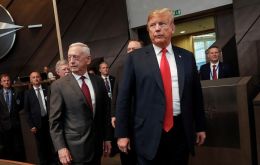
United States defense Secretary Jim Mattis is stepping down from his post, President Donald Trump announced on Thursday, after the retired Marine general clashed with the president over a troop drawdown in Syria and Trump's go-it-alone stance in world affairs.
-
Thursday, December 20th 2018 - 09:09 UTC
In best US tradition, Trump says IS has been defeated and withdraws troops from Syria
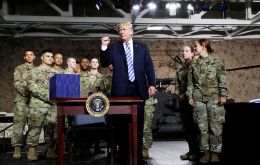
The Trump administration says US troops are being withdrawn from Syria, after the president said the Islamic State (IS) group had been “defeated”. The Pentagon said it was transitioning to the “next phase of the campaign” but did not give details.
-
Monday, October 15th 2018 - 14:34 UTC
Key Naseed-Jaber, Quneitra crossings reopened as Syria reaches out to neighbours

The strategic Naseeb crossing between Syria and Jordan on the Damascus-Amman international highway was reopened Monday, just one day after both countries agreed to it. The crossing had been closed since 2015 when the rebels took over that area in Syria's southern province of Daraa. Also Monday the only crossing point near the Syrian border town of Quneitra between Syria and the Golan Heights, under Israeli occupation since 1967, was reopened for United Nations observers, four years after closing due to the civil war, following a deal between Israel, Syria and the UN.
-
Tuesday, June 26th 2018 - 17:39 UTC
“Uniting the world against terrorism”: OP-ED on the United Nations conference on counter-terrorism

NEW YORK — Terrorism is a persistent and evolving global menace. No country is immune. Social media, encrypted communications and the dark web are being used to spread propaganda, radicalize new recruits and plan atrocities. The threat ranges from the crude tactics of lone actors to sophisticated coordinated attacks and the horrific prospect of terrorists using chemical, biological or radioactive weapons.
-
Tuesday, May 8th 2018 - 08:59 UTC
Guterres praises UK contribution to UN, “Brexit or no Brexit”

Britain will remain a “very important pillar” of the United Nations after Brexit, the organization's secretary general has said. Antonio Guterres’s comments appear to contradict the fears of some opponents of Brexit that the UK’s withdrawal from the EU might throw into question its position as one of the five permanent members of the UN Security Council, alongside the US, Russia, China and France.
-
Wednesday, April 25th 2018 - 09:18 UTC
Trump/Macron summit: much personal chemistry but not so in the Iran issue

President Trump vowed Tuesday to look for common ground with his French counterpart in dealing with Iran but made no commitment to stick with the nuclear agreement he described as “insane” and “ridiculous.” Receiving French President Emmanuel Macron for a state visit at the White House, Trump repeated his criticism of the agreement to freeze Iran's nuclear program, saying it doesn't address Tehran's missile program or its attempts to foment unrest in the region.
-
Thursday, April 19th 2018 - 10:32 UTC
G7 foreign ministers' statement on the Salisbury attack

We, the G7 foreign ministers, of Canada, France, Germany, Italy, Japan, the United Kingdom and the United States of America and the High Representative of the European Union, are united in condemning, in the strongest possible terms, the attack that took place against Sergei and Yulia Skripal, using a nerve agent in Salisbury, United Kingdom, on March 4, 2018. A British police officer and numerous civilians were exposed in the attack and required hospital treatment, and the lives of many more innocent British civilians have been threatened. We express our deepest sympathies to them all and our admiration and support for the UK emergency services for their courageous response.
-
Thursday, April 19th 2018 - 10:12 UTC
G7 leaders: statement on chemical weapons use in Syria and Salisbury attack
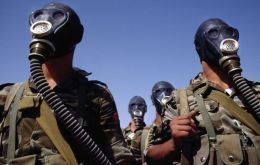
The G7 leaders have united in condemning the use of chemical weapons in Syria and support recent actions by the US, UK and France to degrade and deter further use. Likewise G7 foreign ministers condemned the nerve agent attack and share the UK's assessment that it is highly likely that the Russian Federation was responsible.
-
Wednesday, April 18th 2018 - 08:58 UTC
UK and US alert about “malicious cyber activity” by Russia
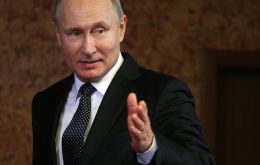
Britain and the US have issued a formal alert about “malicious cyber activity” by Russia amid warnings that relations with Moscow have hit an all-time low. The UK National Cyber Security Centre (NCSC) combined with the FBI and the US Department of Homeland Security to issue an unprecedented joint “technical alert” setting out the threat across the public and private sectors.
-
Monday, April 16th 2018 - 18:22 UTC
Most Latin American countries cautious or critical about bombings in Syria
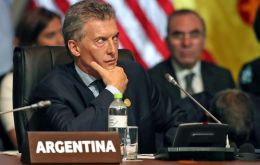
Canadian Prime Minister Justin Trudeau backed air strikes by the United States and its allies on Syria’s chemical weapons program but Argentina, Brazil and Peru voiced caution during a regional summit about the escalating military action.
